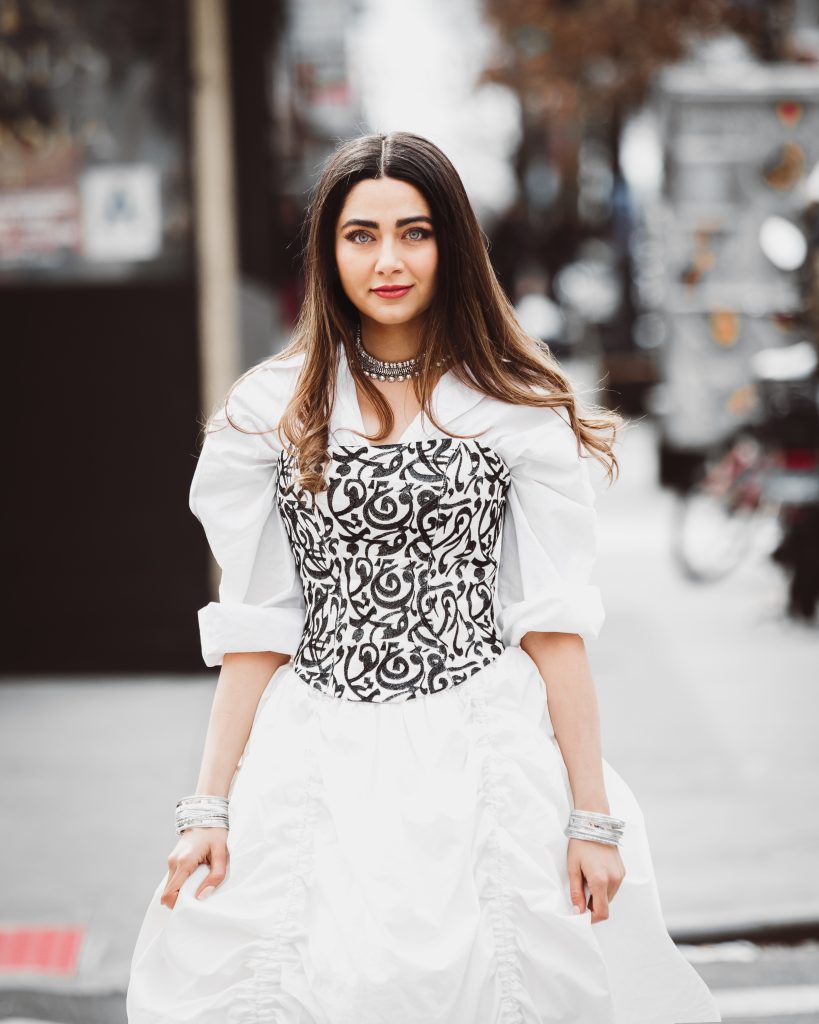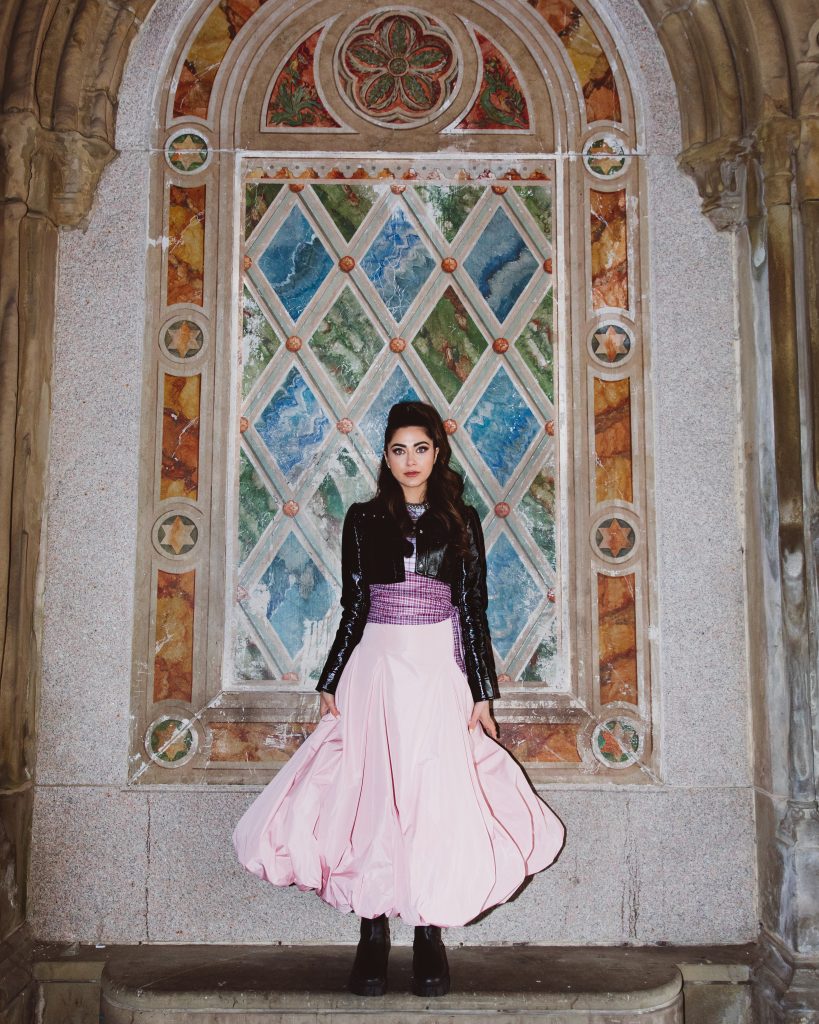Dana Salah is going *big*. Just recently we saw her face on a billboard in, ahem, Times Square in New York, and now her latest track Ghazaleh is going viral. Exclusively with Cosmo ME, Dana discussed how this song came to life and shared some thoughts about the future of Arabic music on the global scene.
Scroll down to read our exclusive interview with Jordanian-Palestinian singer Dana Salah…
Cosmo ME: Describe your experience working on Ghazaleh.
Dana Salah: Fun. More than any record I’ve worked on in the past. The whole thing was lighthearted. From writing the song to recording the vocals to shooting the video in New York City with my friends in the cold. The process was long, but I enjoyed every bit of it. We rewrote the lyrics 3 times. It took us 6 months to finish the production and, of course, I got sick right before my show in Toronto, but in spite of everything it was such a blast.

Cosmo ME: How do you incorporate your Arabic heritage into your songwriting?
Dana Salah: It’s something that, after all these years of making music, just comes naturally for me now. I feel so tied to my roots after living in the US for almost 10 years, between Duke and the early stages of my music career, that it’s something that seeps into my art naturally.
When I was making music in NYC under the moniker King Deco, my aesthetic and branding were pulled from Ancient Rome and Greece. I incorporated a lot of water elements and later on, in hindsight, I realized that it was a result of the environment I grew up with. Amman where I grew up is a city that is sprinkled with ancient Roman ruins. I also grew up during one of its most severe droughts, so the water was pretty scarce. I feel like what I’m doing now is not very different, I’m just more conscious of it.
Cosmo ME: How has the making of Ghazaleh impacted your relationship with your heritage?
Dana Salah: I got really comfortable with Middle Eastern dance and movement. I’m not the best dancer but the type of dance that comes most naturally for me is Middle Eastern dance. I spent a couple of months practicing.
I also love fashion. It’s a big part of my music videos and one of the ways I can really come into my own self as an Arab woman. You’ll see me experimenting with merging modern and traditional elements by designing my own pieces. In the video, I wore two corsets, the red “Tatreez” and the black and white Calligraphy. I layered them over a more modern skirt silhouette.
Cosmo ME: What do your family and friends think of the song?
Dana Salah: I think the energy we had on set and in the studio was translated through the record. The response has been great. I’ve received and come across so many videos of people dancing to it: young children in the class, belly dancers, etc.
Cosmo ME: Do you have any Palestinian-American idols in the music scene? How do they inspire you?
Dana Salah: Peers, idols, all of the above. I’m rooting for every Palestinian (and Arab) in the space. We’re carving a space for ourselves and our culture and it’s incredible to see. I love what Saint Levant is doing repping Palestine, Lana Lubany wearing the Kuffiyeh at her last show, Lina Makhoul speaking up on growing up in the West Bank, Noel, Zeyne… It’s all really amazing to watch.

Cosmo ME: What was the thought process behind filming the Ghazaleh music video in the streets of NYC? Describe the experience.
Dana Salah: After graduating from Duke (I studied Economics B.S. and Theater Arts B.A.), I moved to New York City to work at an advertising firm called Ogilvy and Mathers as well as start a career in music.
When I was living in New York I was kind of doing my own thing. Making music under a very indie pop name, living in Williamsburg. When I look back at that time the only thing I wish I had done differently was connecting with more Arabs in New York. I wanted to showcase that our heritage and culture are super interwoven in the biggest city in the world. From Steinway Street to the Halal carts, to hookah lounges, to exhibitions at The Met… It’s all there and is something I’m extremely proud of. Even the release party brought in a pretty big Arab/Arab-American crowd, it was really beautiful to experience.
Cosmo ME: How do you hope audiences respond to your newest song?
Dana Salah: I hope they love it. I hope it brings them joy and I hope they daaaance.

Cosmo ME: What are your memories associated with Fala7i music?
Dana Salah: I don’t have a ton from when I was younger but I have a very powerful few. Mainly my grandmother sang them to me: Ya Zareef Al Toul, Wein 3a Ramallah.
Growing up they were always part of wedding celebrations and now I’m just so inspired by the meaning and melodies that I’ll go down the Internet rabbit holes trying to find Palestinian Folk Songs that I haven’t come across before.
Cosmo ME: Does going back to your roots for musical inspiration provide catharsis to you in any way? Please, elaborate.
Dana Salah: I wouldn’t say catharsis. It’s inspiring and I find so much beauty in our heritage that I’m excited to share with the rest of the world. We don’t necessarily have the best connotations with elements of our culture and heritage (i.e. the fabrics, the music, etc).
There’s a huge discrepancy between the connotations Arabs in the diaspora have with cultural elements (food, fabric, music, sounds, cinema) and the connotations Arabs in the Middle East have with it. It’s not necessarily all positive and it’s not all consistent. I feel like when I was in the Middle East I glorified the West and then when I spent more time in the US (especially when I was stuck there during COVID).

Cosmo ME: How do you envision Arabic music/Fala7i Pop in the global music scene in the future? How do you see yourself within it?
Dana Salah: I think we’ve seen over the years how music in languages other than English has made its way to the main stage in mainstream music. I think we’re all anticipating Arabic music finding its own space, center stage in the global music market.
I hope I’m someone who helps make that happen.
All images from @danasalah Instagram
Follow Dana Salah and her music career here.

